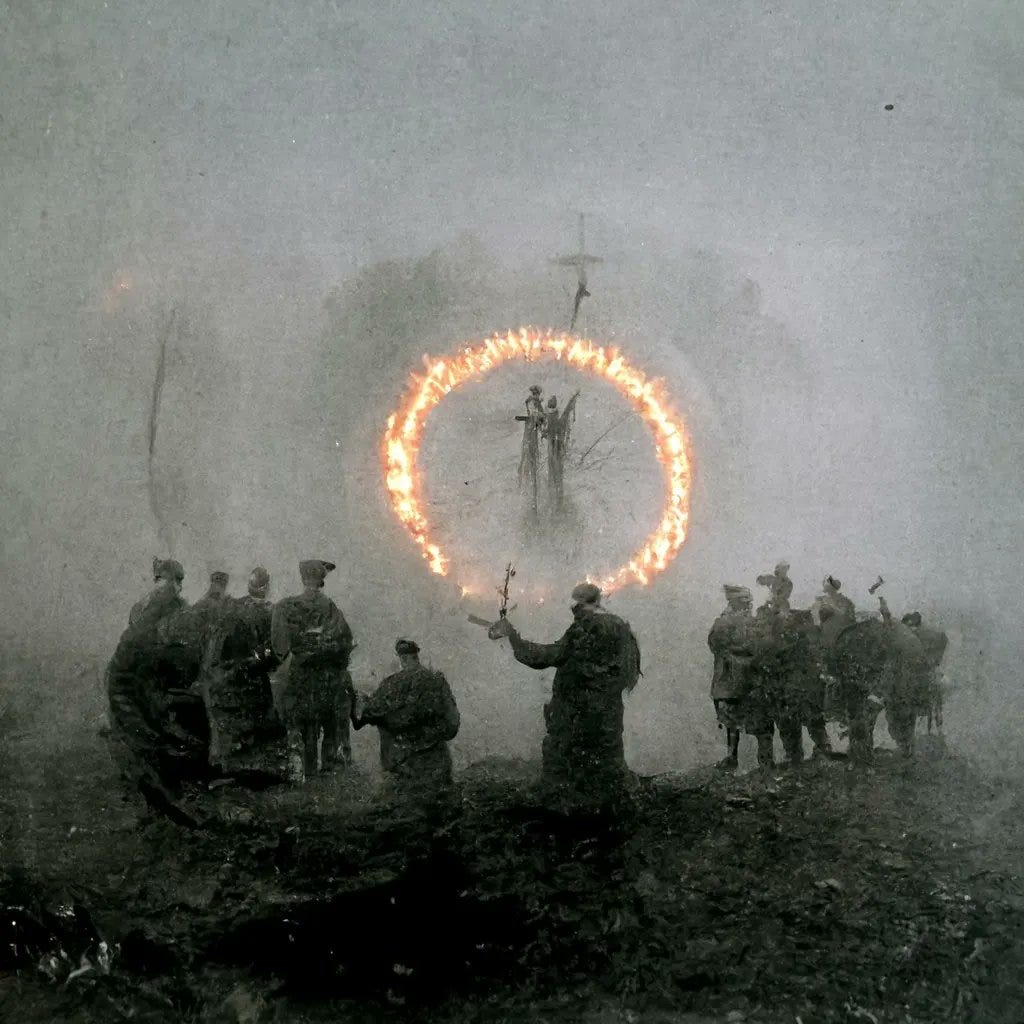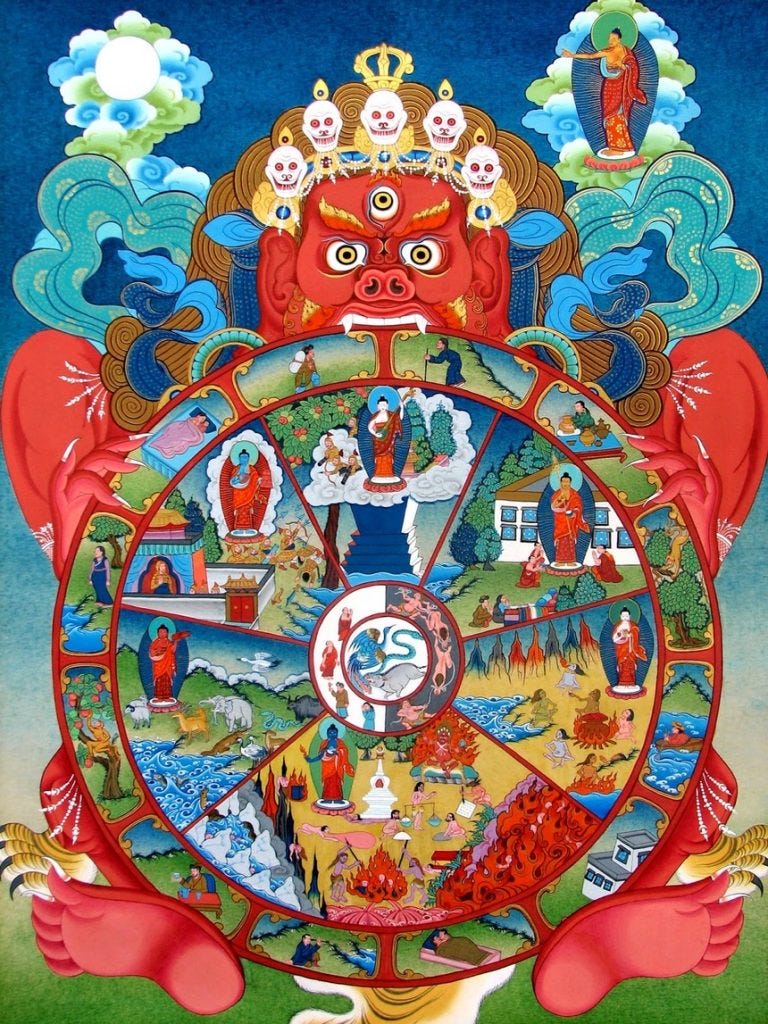I.
On the day before the burning of the Pyramid, the men who got down from their high horses scourged me with burning irons to compel me to reveal the site of a buried treasure. Before my eyes they toppled the idol to the god, yet the god did not abandon me, and I held my silence through their tortures. They tore my flesh, they crushed me, they mutilated me, and then I awoke in this prison, which I will never leave alive. I have lost count of the years I have lain in this darkness; I who once was young and could walk about this prison can do nothing now but wait, in the posture of my death, for the end the gods have destined for me.
II.
Driven by the inevitability of doing something, of somehow filling time, I tried, in my darkness, to remember everything I knew. Thus did I gradually conquer the years, thus did I gradually come to possess those things I no longer possessed. One night I sensed that a precise recollection was upon me; before the traveler sees the ocean, he feels a stirring in his blood. Hours later, I began to make out the memory; it was one of the legends of the god. On the first day of creation, foreseeing that at the end of time many disasters and calamities would befall, the god had written a magical phrase capable of warding off those evils. He wrote it in such a way that it would pass down to the farthest generations, and remain untouched by fate. No one knows where he wrote it, or with what letters, but we do know that it endures, a secret text, and that one of the elect shall read it. I reflected that we were, as always, at the end of time, and that it would be my fate, as the last priest of the god, to be afforded the privilege of intuiting those words. The fact that I was bounded within a cell did not prevent me from harboring that hope; I might have seen the inscription thousands of times, and need only to understand it.
What type of sentence would an absolute mind construct? Consider that even in human languages there is no proposition that does not imply the whole universe. Consider that in the language of a god every word would enunciate that infinite concatenation of facts, and not in an implicit but in an explicit manner, and not progressively but instantaneously. A god ought to utter only a single word and in that word absolute plenitude. The ambitions and poverty of human words— all, world, universe, god—are but shadows or simulacra of that Word which is the equivalent of a language and all that can be comprehended within a language.
III.
One day or one night—between my days and nights, what difference can there be?—I dreamed of a wheel that was made of water, but also of fire, and although I could see its boundaries, it was infinite. It was made of all things that shall be, that are, and that have been, all intertwined, and I was one of the strands within that all-encompassing fabric, and Hakim the Veiled, who had tortured me, was another. In it were the causes and the effects, and the mere sight of that wheel enabled me to understand all things, without end.
Joy of understanding, greater than the joy of imagining, greater than the joy of feeling! I saw the infinite processes that shape a single happiness; I saw a silvery cobweb in the center of a black pyramid; I saw all the mirrors on earth and none of them reflected me; I saw a woman whom I shall never forget; I saw her tangled hair, her tall figure, I saw the cancer in her breast; I saw horses with flowing manes on a shore of the Caspian Sea at dawn; I saw a perfect being shed a single tear; I saw the delicate bone structure of a hand; I saw tigers, machines, herds, tides, and armies.
And in this wild trembling braid of existence was the Word, a formula of fourteen (apparently) random syllables that would make me omnipotent if I spoke them aloud. Speaking it would make this stone prison disappear, allow the day to enter my night, make me young, make me immortal, bury the sacred blade in Hakim’s breast, rebuild the Pyramid, rebuild the empire. Fourteen syllables and I, al-Raziel, would rule the lands of my forefathers once more. But I know that I shall never speak those words, because I no longer remember al-Raziel.
He who has glimpsed the universe, he who has glimpsed its burning designs, can have no thought for a man, for a man's trivial joys or calamities, even if he himself be that man. What does he care about the fate of that man, what does he care about that man's nation, when now he is no one? That is why I do not speak the formula, that is why, lying in darkness, I allow the days to forget me.
Story Notes
Bless your sweet heart if you thought i was capable of writing like this—what you just read was a remix of passages from different Borges stories with a few of my own edits and flourishes. My original idea was to write a vignette inspired by the haunting images you saw above (source below). The pictures of the burning wheel reminded me of a passage from a favorite Borges story and I thought I might take that passage and splice it into some of my own writing. I was really convinced that this was a brilliant idea until I saw how dreadfully bland and uninspired my writing looked in comparison to Borges’ prose (completely predictable in hindsight). I don’t want to give away any spoilers, but shoot me an email if you want to know which stories I remixed (rogersbacon17@gmail.com).
I figured I might share a sketch of the vignette I tried and failed to write; perhaps a better writer than me can make something of it. The plot I had in mind centered around a religious group known as the Saṃsārans (or the Zealots if you were a member of the opposition), deriving their name from Saṃsāra, the concept of rebirth and "cyclicality of all life, matter, existence" in most Indian religions. The Saṃsārans maintained that it was hope itself, in any and all of its forms, that trapped us in the cycle of death and rebirth. The only way to achieve liberation was to bring about a circumstance in which all was truly lost and all was hope extinguished, now and forever.
The Saṃsāran’s plan to achieve this hopeless world was to initiate a planetary nuclear holocaust. Because lower doses of radiation don’t kill instantaneously, their hope was to create a “walking dead” period in which everyone left alive would know, without a shred of doubt, that their flesh had been corrupted and death was imminent and inevitable—a situation in which it was really, truly over. Then, and only then, would we be free.
My plan was to somehow convey or imply all of this background in a few short paragraphs (I never figured out how or I would have just written the damn story) and then close with the images of the burning wheel (the symbol of the Saṃsārans of course) and the associated passage about the infinite wheel, the implication being that the passage was a first-person description of a Saṃsāran priest experiencing Nirvāṇa during said ritual.
Image credit:













Hope to see Erik Hoel comment on this since he dislikes the idea of AI "art". I, for one, find real-life is often sufficiently nasty and don't seek out horror. But I applied for a beta account on Midjourney anyway. I think your post is pretty inspired and worked well.
This is a fantastic experiment. The images are really haunting and ask for a backstory for them. Would love to play with midjourney myself in the future. Also, I'm impressed with how you orchestrated Borges' passages around the idea, great job. For a second, I felt cheated and fascinated at the same time :D
I wonder, how common it will be to use the sequence - a text prompt, an AI-generated image for it, writing a story about it (there's already textual Magic Realism Bot on Twitter people including myself are trying to use as prompts, quite fun). Some people might see this as an utterly wrong approach that 'replaces' the imagination but I think they would be wrong. At least, you still need to come up with a prompt, then you need a picture that would spark imagination, then you need to see a viable pattern there, something that you can turn into a story, and only then if you're lucky you can build upon it. But it's no different from how the fiction writing process has been working for me personally. Often my mind just grabs a completely random and bizarre idea (oh, let's write a story about wojak brain meme, or what if an adtech-haunted guy in a tinfoil hat visits Hitler in the hell to talk about marketing, etc.). In any case, ideas themselves are cheap unless implemented. I have a big backlog of things I want to write about but I doubt I'll ever close it. AI can make countless images for every entry in it and I wonder if they will be helpful to make the craziest ideas alive, or the opposite – misdirecting from the original premise, more 'human' sort of imagination. Regardless, the hardest part is writing an actual story based on the idea / prompt / image, on which I think you agree with me :D Let's way till GPT-something can write stories based on midjourney's images. That would be fun to watch at least.
P.S. I'll email you for story titles (I have some guesses, at least after rereading I vaguely recognised some of the passages)